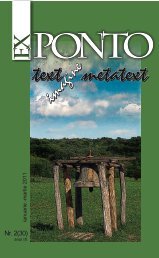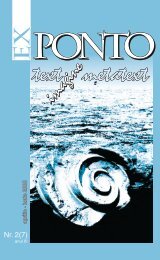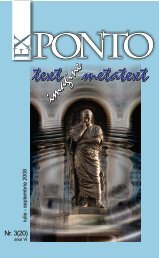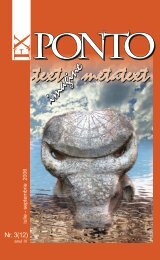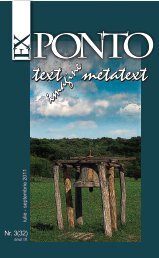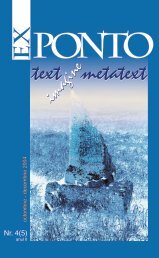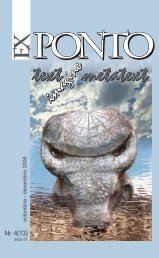Nr. 3 (28) anul VIII / iulie-septembrie 2010 - ROMDIDAC
Nr. 3 (28) anul VIII / iulie-septembrie 2010 - ROMDIDAC
Nr. 3 (28) anul VIII / iulie-septembrie 2010 - ROMDIDAC
Create successful ePaper yourself
Turn your PDF publications into a flip-book with our unique Google optimized e-Paper software.
arely remember Naoko, who seemed the world to him then, and the most<br />
vivid memory related to that particular time is the setting, the background,<br />
the “insignificant”. All that is left for him is an abandoned place, a meadow<br />
without people:<br />
“Everything that seemed so important back then-Naoko and the self I was<br />
then and the world I had then: where could they have all gone? It’s true, I can’t<br />
even bring back her face- not straight away, at least. All I’m left holding is a<br />
background, pure scenery, with no people at the front.” 1<br />
His own persona is nothing but an empty space, where the “kicks” which<br />
Naoko’s memory inflicts upon him do not even hurt, as a result of the trauma<br />
that his beloved’s eventual suicide worked on him. The memory of her grows<br />
weaker and weaker and only writing can save Naoko from loss:<br />
There’s no pain at all. Just a hollow sound which echoes with each kick. And<br />
even that is bound to fade one day. At Hamburg airport though, the kicks were<br />
longer and harder than usual. Which is why I am writing this book. To think. To<br />
understand. It just happens to be the way I’m made. I have to write things down<br />
to feel I fully comprehend them.(NW: 8)<br />
Ex Ponto nr.3, <strong>2010</strong><br />
Going back to music, it is mostly classical or jazz music that strike a<br />
sensitive chord in Murakami’s characters. South of the Border, West of the<br />
Sun takes its name after Nat King Cole’s song, which carries a sentimental<br />
value, and, as in Norwegian Wood, it triggers off the memory of Shimamoto,<br />
the unattainable woman whom Hajime (the “I “) pursues yet never completely<br />
possesses. This jazz song is associated with the times when Hajime and<br />
Shimamoto listened to old pick-up disks in Shimamoto’s bedroom and with their<br />
meeting years later in Hajime’s jazz bar. If Hajime sees Shimamoto as being<br />
from “the other world”, this is reinforced by the way Shimamoto interprets the<br />
title of Nat King Cole’s song. As she confesses, she was disappointed when<br />
she found out that the song was actually about crossing the border to Mexico.<br />
In her imagination, “south of border” had to do with “something beautiful, big<br />
and soft” 2 , something from the country of the probable, as she calls it, whereas<br />
“west of the sun” could be explained through the Siberian hysteria, an illness<br />
allegedly suffered by farmers living in Siberia who, drudging on the open fields<br />
with nothing in view but the horizon of the land in all directions, eventually<br />
lose their minds and head off in desperation in the direction of the setting sun.<br />
The hysterical farmers would collapse and die from the exhaustion in the end.<br />
Unquestionably, both “south of border” and “west of the sun” are mysterious<br />
places. When asked by Hajime what was west of the sun, Shimamoto replies:<br />
“I don’t know. Maybe nothing. Or maybe something.” (SBWS: 156)<br />
An interesting suggestion would be that the two essential women in<br />
Hajime’s life, Shimamoto and Izumi’s cousin, stand for the south of border and<br />
west of the sun. 3 Shimamoto is that “beautiful, big and soft” ineffable thing<br />
from the country of the probable, while Izumi’s cousin is a nameless woman<br />
for whom the protagonist felt an irresistible magnetism that drew him to an<br />
immense sexual urge, such that he felt a consuming desire to almost grab<br />
something inside her. In Lacanian psychoanalysis, this urge can be explained<br />
through the passion for the Real. The passion for the Real is the passion for<br />
an ultimate object or experience that promises to offer the final guarantee of<br />
our ontological reality and significance, yet, what the Real often turns out to<br />
be is not some final reference point from which the true nature of reality could<br />
168




